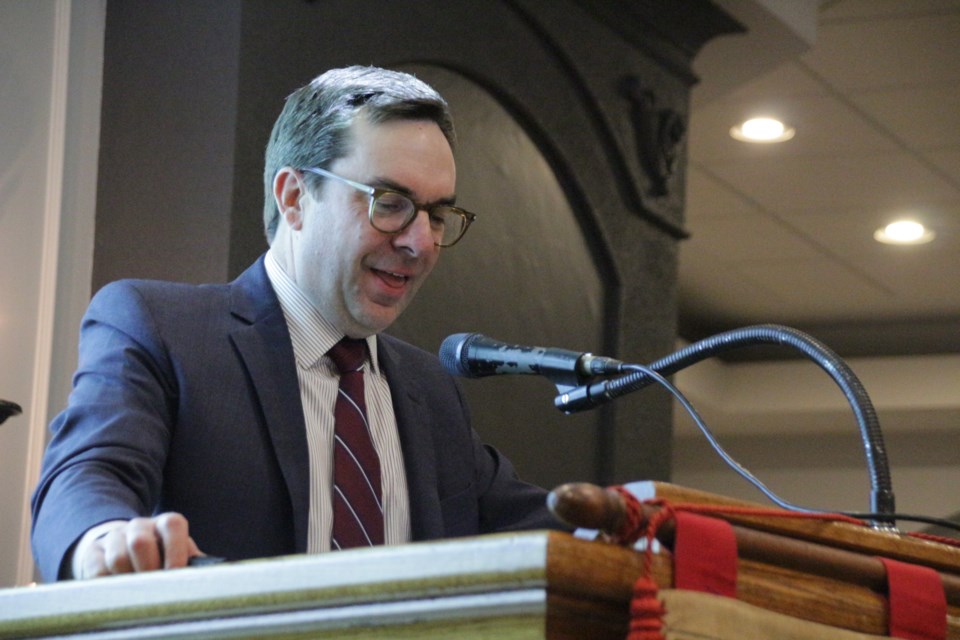The creation of history has entered a new era in the digital age. But trust remains a critical factor.
That trust is created in communities and that’s where it will be rebuilt, according to Kevin Kee, who returned to his hometown Saturday to give a talk to those attending the 22nd Annual Sir John A. Macdonald Dinner – A Celebration of Canada. The popular yearly event is a fundraiser for the Orillia Museum of Art and History (OMAH).
The topic of Kee’s talk was how we rebuild trust in the digital age at a time when trust seems to be a challenge, owing to the vast amounts of information available to us.
As a digital humanist, he has spent years studying how history can be studied in this digital age.
“One of the challenges of history is that we have too much information to sort through,” said Kee, Dean of Arts at the University of Ottawa, author, and historian.
Where technology has created connectedness, it is also a conduit for our anger toward one another, he said.
“So how do we rebuild trust in the digital age?” Kee asked those that filled the banquet room at Hawk Ridge Golf and Country Club on Saturday night.
He said we have to understand that we can’t legislate social media. Instead, we should engage with it.
“I’m going to pay special attention to how digital technologies can be used to create history,” said Kee, adding the three ways of doing that is by research, writing, and communicating.
Libraries have been, and to some extent still are, hubs for conducting research, he said. But nowadays they’re becoming more social hubs than anything else.
“The biggest problem today isn’t scarcity of information, it’s the abundance of it,” noted Kee. “The challenge for historians comes when they, for instance, want to write about the history of a U.S. president.”
If you want to write about Lyndon B. Johnson, you would have to go through 40,000 memos, he said. For the Bill Clinton administration, you would have to go through 4 million emails, for the George W. Bush administration, it’s 200 million emails, and for the Barack Obama administration, it’s 300 million emails.
“The situation is going to be even worse for those going to university in the next few years to study history,” said Kee, adding, these days, knowledge accumulates faster than we can study it.
“For us to study history, it has to come to us,” he said. “And we can’t allow Google to decide it for us.”
As a historian, Kee said, he and his colleagues have worked on technologies that would use algorithms and web crawlers and bots to scrape through the zettabytes (one sextillion) of information and filter required knowledge into a pile for later use.
“This is how we can research history in the digital age,” he said.
The digital age has also changed the way we write history, said Kee.
“Restricting our expression to books makes less and less sense each day,” he said. “Knowledge is becoming more interactive each day.”
He illustrated his point by giving an example of how holograms of Holocaust survivors being interviewed are being used to educate those visiting museums on the subject.
Lastly, Kee talked about how communicating history has changed in this lifetime.
“(The) internet is not just about consuming,” he said. “It’s also about creation.”
As a digital humanist and historian, Kee said, he was faced with the dilemma of imparting historical knowledge to the younger generation, who mostly found it boring, until it was presented to them wrapped into digital games.
He explained this by using the example of the popular game, Civilization. Kee furthered his idea by talking about the Our Marathon: The Boston Bombing Digital Archive (marathon.library.northeastern.edu). The archives preserves every aspect of the event online.
“Now we can go back many years from now and see how that incident happened and what everyone affected by it experienced,” he said.
"These are ways that we will be able to see the past with computers,” Kee added.
Louise Hoover, who had studied history, said she found the talk to be very interesting.
“I wanted to learn more about how he plans on using digital technology to filter out relevant information,” said the Oro-Medonte resident. “I guess it may have become too technical for me, but I’d like to know more.”
Orillia resident Carol Deimling thought the talk was relevant in the current digital age and in making history relevant for the new generation.
“I think it’s important to be thinking about the digital age, because if we don’t, we will be left behind,” she said. “If you want to make history important, you have to help young people understand it.”
The event that raises funds for OMAH is older than the museum itself, said Ninette Gyorody, executive director of the museum.
“The popularity is still high and so is the calibre of speakers each year,” she said.
